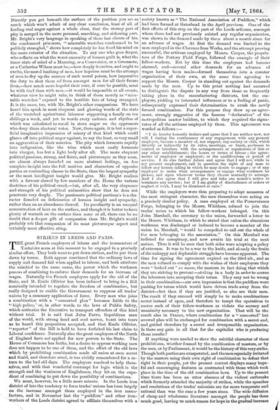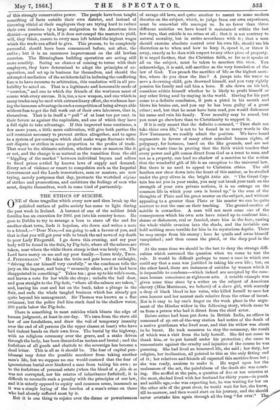STRIKES IN LEEDS AND PARIS.
Fr' great French employers of labour and the ironmasters of Yorkshire seem at this moment to be engaged in a precisely similar effort. They both want to put down strikes, and to put them down by terror. Both appear convinced that the ordinary laws of supply and demand fail when applied to labour, and both attribute the mischief to the same cause, the power which the workmen possess of combining to enforce their demands for an increase of wages. Naturally the French employers apply for the aid of the State, and M. Emile 011ivier has been induced to bring in a Bill nominally intended to regulate the freedom of combination, but really designed to enable the Government to suppress all trades' unions by a summary application of force. Every man who joins a combination with a "concerted plan" becomes liable to the "high police," or, in other words, to the laws of Public Safety, which authorize the Executive to transport offenders of this kind without trial. It is said that Jules Fevre, Republican man of the world, with strong head and cool nerves, burst into tears as he heard this proposition accepted, and that Emile 011ivier, " reporter " of the Bill is held to have forfeited his last claim to Liberal confidence. Naturally also the great employers of the North of England have not applied for new powers to the State. The House of Commons has faults, but a desire to oppress working men does not happen to be one of them, and the effect of the old laws which by prohibiting combination made all union at once secret and timid, and therefore cruel, is too vividly remembered for a re- turn to the bad old days. The employers resolved to help them- selves, and with that wonderful contempt for logic which is the strength and the weakness of Englishmen, they hit on the expe- dient of combining to put down the possibility of combinations.
We must, however, be a little more minute. In the Leeds iron district of late the tendency to form trades' unions has been largely on the increase amongst those employed in the iron manu- facture, and in November last the " puddlers and other iron- 'workers of the Leeds district agreed to affiliate themselves with a
society known as "The National Association of Paddlers," which had been formed at Gateshead in the April previous. One of the first effects of this step on the part of the Leeds artisans, amongst
whom there had not previously existed any regular organization, was shown in the demand made by the in about a month since for
an advance of wages. At first the demand was limited to the men employed in the Clarence Iron Works, and the attempt proving successful, the artisans employed by Messrs. Cooper, the proprie- tors of the Pottery Field Forge, followed the example of their fellow-workers. But by this time the employers had become alarmed, and—several other demands for an advance of wages having been made—formed themselves into a counter organization of their own, at the same time agreeing to support the Messrs. Cooper in standing out against the demands made by the men. Up to this point nothing had occurred to distinguish the dispute in any way from those so frequently taking place in the manufacturing districts, but the em- ployers, yielding to interested influences or to a feeling of panic, subsequently expressed their determination to crush the newly formed combination. For this purpose they drew up an agree- ment, strongly suggestive of the famous "declaration" of the metropolitan master builders, to which they required the signa- tures of all the artisans employed by them. This agreement was worded as-follows :—
" I do hereby honestly declare and agree that I am neither now, nor will I during the continuance of any engagement with any present employer, become a member of, nor support, any society or club, which directly or indirectly by its rules, meetings, or funds, professes to control or interfere with the arrangements or regulations of this or any other establishment ; the hours or terms of labour ; the agree- ments of employer or employed; or the qualifications or period of service. I do also further delare and agree that I will not, while in my present employment, call in question the right of any man to follow any honest calling in which he may desire to engage; or of any employer to make what arrangements or engage what workmen he pleases, and upon whatever terms they choose mutually to arrange. And I also agree that I will give and take one month's notice to terminate any service ; but if I am guilty of disobedience of orders or neglect of work, I may be dismissed at once."
While the employers were thus preparing to adopt measures of the most stringent character, the men themselves were acting on a precisely similar policy. A man employed at the Perseverance Forge, belonging to the Messrs. Whitham, refused to join the trades' union to which his fellow-workers belonged. On this John Marshall, the secretary to the union, forwarded a letter to the Messrs. Whitham, in which he stated that unless the obnoxious workman was discharged or induced to become a member of the union he, Marshall, "would be compelled to call out the whole of the men belonging to the association." On this Marshall was indicted for conspiracy, and now awaits his trial at the next assizes. Thus it will be seen that both sides were adopting a policy of extremes. It was to be a war to the knife, and already the fruits of the unhappy and deplorable struggle have become apparent. The time for signing the agreement expired on the 23rd ult., and as the men refused to comply with the wishes of their employers they were "locked out" en masse, the masters in fact doing that which they are striving to prevent—striking in a body in order to coerce the labourers into accepting their terms. They may not be wrong in their combination—our own impression is that the puddlers were pushing for terms which would have driven trade away from the district—but then if they are justified, so also are their men. The result if they succeed will simply be to make combinations secret instead of open, and therefore to tempt the operatives to coerce such of their fellow-workmen as violate the secrecy and unanimity necessary to the new organization. That will be the result also in France, where combination for a "concerted" but avowed plan will be exchanged for combination with a secret end, and guided therefore by a secret and irresponsible organization. Is there any gain in all that for the capitalist who is producing those results?
H anything were needed to show the suicidal character of these prohibitions, whether framed by the combination of masters, or by the men, or by Parliament, it would be the history of thisverystrike. Though both parties are exasperated, and themen especially irritated by the masters using their own right of combination to defeat that right in their people, yet the present contest displays many hope- ful and encouraging features as contrasted with those which took place in the time of the old combination laws. Up to the present time there has been an utter absence of the violent outbreaks which formerly attended the majority of strikes, -while the speeches and resolutions of the trades' unionists are far more temperate and rational than was the case a few years since. The wide diffusion of cheap and wholesome literature amongst the people has done much good, leaving us much reason for hope in thegradnal increase
of this strongly conservative power. The people have been taught something of facts outside their own district, and instead of
throwing vitriol at their employers they are trying hard to reduce their own numbers by a large emigration to the American iron district—a process which, if it does not compel the mastersto yield, will, they think, ensure to every man left behind the highest wages which the trade can afford to give. This process, to be completely successful, should have been commenced before, not after, the strike ; but it is an enormous improvement on the old lawless coercion. The Birmingham building operatives are acting still more sensibly. Seeing no chance of coining to terms with their employers, they have determined to adopt the principles of co- operation, and set up in business for themselves, and should the attempted mediation of the architects fail in inducing the conflicting forces to have recourse to arbitration, this resolution will in all pro- bability be acted on. That is a legitimate and honourable mode of "coercion," and one to which the friends of the workmen must of course wish every success. It is, too, a new weapon, and one which in many trades maybe used with extraordinary effect, the workmen hav- ing the immense advantage in such a competition of being always able without fuss to get the full work out of their own labourers, that is, themselves. That is in itself a " pull " of at least ten per cent. in their favour as against the capitalists, and one of which they have a full right to take advantage. If this improved tone continues, a few more years, a little more cultivation, will give both parties the self-restraint necessary to prevent strikes altogether, and to agree to a system of per-centages which shall make wages fluctuate with- out dispute or strikes in some proportion to the profits of trade. That must be the ultimate solution, whether men or masters like it or not, and the change is as natural as the transition from the old " higgling of the market" between individual buyers and sellers to fixed prices settled by known laws of supply and demand. Every act of violence or resort to compulsion such as the Imperial Government and the Leeds ironworkers, men or masters, are now trying, merely postpones that day, protracts the wretched regime of strikes and prosecutions, and embitters the feelings of men who must, despite themselves, work in some kind of partnership.































 Previous page
Previous page